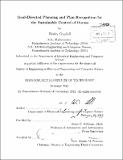Goal-directed planning and plan recognition for the sustainable control of homes
Author(s)
Graybill, Wesley (Wesley Darwin)
DownloadFull printable version (7.153Mb)
Other Contributors
Massachusetts Institute of Technology. Dept. of Electrical Engineering and Computer Science.
Advisor
Brian C. Williams.
Terms of use
Metadata
Show full item recordAbstract
The goal of this thesis is to design an autonomous control system for the sustainable control of buildings. The control system focusses on satisfying three goals to encourage and facilitate a more sustainable lifestyle for the future: sustainability, comfort, and convenience. First, the system must be sustainable, meaning it controls the home to minimize the energy required to meet the living requirements of the resident. Second, the home must also place the resident's comfort as first priority, and not sacrifice comfort for energy savings. A central challenge facing the goal of comfort is uncertainty. Uncertain weather conditions can result in violations of the resident's comfort if the control system does not explicitly consider these factors. The home must probabilistically guarantee to meet resident comfort and functional requirements even under uncertain conditions. Finally, the system must be convenient and not place undue burden on the resident. To accomplish these goals, we provide three solutions: (1) goal-directed optimal planning, which supports efficiency, (2) risk-sensitive planning, which addresses comfort, and (2) intent recognition, which supports ease of use. Goal-direction improves efficiency by specifying what energy consuming activities the users need and when, and enables peak demand to be reduced by specifying the flexibility that the user has with respect to when activities can be performed. Risk sensitive planning addresses user comfort by explicitly considering uncertain factors and planning to limit the risk of violating resident requirements. This solution uses a recently developed plan-executive called probabilistic Sulu (p-Sulu) that leverages a recent algorithm called iterative risk allocation (IRA) to robustly find an optimal control sequence for the home. The second challenge, plan recognition, accomplishes our third goal of convenience. To facilitate widespread adoption, the control system should require minimal user interaction. Plan recognition solves this problem by predicting a resident's schedule based on observations of the resident. p-Sulu can then optimally control the home according to this schedule to minimize energy use, while ensuring the house is comfortable while the resident is home, and saving energy while the resident is away. We present the concept design of a novel solution to plan recognition over timed concurrent constraint automata (TCCA) that provides the initial capabilities necessary to achieve this goal.
Description
Thesis (M. Eng.)--Massachusetts Institute of Technology, Dept. of Electrical Engineering and Computer Science, 2012. Cataloged from PDF version of thesis. Includes bibliographical references (p. 89-92).
Date issued
2012Department
Massachusetts Institute of Technology. Department of Electrical Engineering and Computer SciencePublisher
Massachusetts Institute of Technology
Keywords
Electrical Engineering and Computer Science.